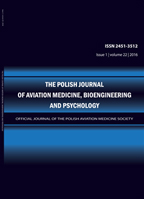2014, Volume 20, Issue 2
Pilot’s Panel as a Technical Teaching Aid in Aviation Medicine
Mirosław Dereń1, Marcin Piotrowski1, Paweł Pomaski1, Andrzej Jarosz1
-------------------------------------------------------------------------------------------------
1Scientific and Didactic Centre, Military Institute of Aviation Medicine
Autor korenspondencyjny: Mirosław Dereń; Scientific and Didactic Centre, Military Institute of Aviation Medicine; email: mderen[at]wiml.waw.pl
Full text
Streszczenie
Introduction: Technical protection measures for airborne personnel in reduced pressure conditions are always prone to damage or failure. In such cases, the level of training and the ability to cope with the conditions of altitude hypoxia potentially presenting direct threat to human life are of key importance for safety and operational efficacy of pilots. Training in simulated conditions may increase the safety of trainees, albeit not guarantee it. Therefore, training methods should be continuously improved, especially in the field of safety and reliability of operation of flight simulators as well as the reliability of procedures.
Methods: In order to increase their awareness under the influence of hypoxic conditions, a switching module was designed to facilitate the change in the source of gas provided for respiration to trainees exposed to reduced atmospheric pressure in a low-pressure chamber. The article describes the design and operation of the pilot's panel module installed in each training station within the low-pressure chamber.
Conclusions: The solution met the technical assumptions. The functionality of the manual switching module will be maintained in the future automatic gas-switching system within the respiratory installation.
Słowa kluczowe
pilots, hipoxia, low-pressure chamber, aviation medicine
